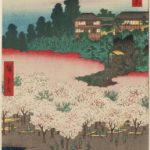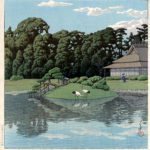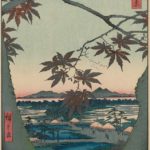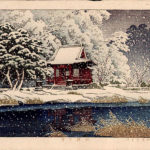Table of Contents
The summary of “The Narrow Road to the Deep North”
Summary
“The Narrow Road to the Deep North” (奥の細道, Oku-no hosomichi) is a travel writing with haiku poems by Matsuo Basho (1644-1694).
Check the famous 10 haiku poems by Matsuo Basho.
He departed with the disciple Kawai Sora March 27 in 1689, traveled around Tōhoku region, and reached Ōgaki August 21. The journery finished when he visited Ise Shrine. It took more than 150 days and the walking distance was 2400km (about 1490mile).
This travel writing gets a high-reputation as the finest and perfect among Basho’s travels, and it is considered as one of the best traveling works in the history of Japanese literature. The sentences are so refined and full of “Sabi“. The sentences and haiku poems interact with each other to form a poetic world. In addition, he saw the facts of the journey as a material of literature. In order to aim for completion as a literary work, he developed an idea without sicking to whether it was fact or not.
Opening sentences
<Japanese>
月日は百代の過客にして、行かふ年も又旅人也。舟の上に生涯をうかべ馬の口とらえて老をむかふる物は、日々旅にして、旅を栖とす。古人も多く旅に死せるあり。予もいづれの年よりか、片雲の風にさそはれて、漂泊の思ひやまず、海浜にさすらへ、去年の秋江上の破屋に蜘の古巣をはらひて、やゝ年も暮、春立る霞の空に、白河の関こえんと、そヾろ神の物につきて心をくるはせ、道祖神のまねきにあひて取もの手につかず、もゝ引の破をつヾり、笠の緒付かえて、三里に灸すゆるより、松島の月先心にかゝりて、住る方は人に譲り、杉風が別墅に移るに、
草の戸も住替る代ぞひなの家
面八句を庵の柱に懸置。
<English>
-Translated by Donald Keene
The months and days are the travellers of eternity. The years that come and go are also voyagers. Those who float away their lives on ships or who grow old leading horses are forever journeying, and their homes are wherever their travels take them. Many of the men of old died on the road, and I too for years past have been stirred by the sight of a solitary cloud drifting with the wind to ceaseless thoughts of roaming.
Last year I spent wandering along the seacoast. In autumn I returned to my cottage on the river and swept away the cobwebs. Gradually the year drew to its close. When spring came and there was mist in the air, I thought of crossing the Barrier of Shirakawa into Oku. I seemed to be possessed by the spirits of wanderlust, and they all but deprived me of my senses. The guardian spirits of the road beckoned, and I could not settle down to work.
I patched my torn trousers and changed the cord on my bamboo hat. To strengthen my legs for the journey I had moxa burned on my shins. By then I could think of nothing but the moon at Matsushima. When I sold my cottage and moved to Sampū’s villa, to stay until I started on my journey, I hung this poem on a post in my hut:
kusa no to mo
sumikawaru yo zo
hina no ie
Even a thatched hut
May change with a new owner
Into a doll’s house.
This became the first of an eight-verse sequence.
Route of The Narrow Road to Deep North
- Fukagawa
- Senju
- Soka
- Kasukabe
- Mama
- Mibu
- Kanuma
- Nikko
- Tamanyu
- Yasaka
- Otawara
- Kurobane
- Takaku
- Nasu
- Hatajuku
- Yabuki
- Sukagawa
- Koriyama
- Nihonmatsu
- Fukushima
- Iisaka
- Shiraishi
- Iwanuma
- Sendai
- Tagajo
- Ishinomaki
- Tome
- Ichinoseki
- Hiraizumi:Chuson-ji Temple
- Iwade-san
- Naruko
- Sakaida
- Obanazawa
- Risshakuji:Yamadera (Risshakuji) Temple
- Oishida
- Shinjo
- Tozawa
- Gassan
- Yudono-san
- Haguro-yama
- Tsuruoka
- Fukiura
- Kisakata
- Oyama
- Atsumi
- Kitanaka
- Murayama
- Tsuiji
- Niigata
- Yahiko
- Izumozaki
- Kashiwazaki
- Koriyama
- Naoetsu
- Takada
- Nou
- Itoigawa
- Ichiburi
- Namerikawa
- Takaoka
- Kanazawa
- Komatsu
- Yamanaka
- Daishoji
- Matsuoka
- Fukui
- Imajo
- Tsuruga
- Irogahama
- Ogaki
If you want to hear Basho’s haiku in Japanese, please subscribe for unlimited posts.
30 Matsuo Basho’s haiku poems including the best10 with Japanese voice (only subscriber)
Sample (Old Pond haiku poem)
Related posts:
 Best 10 famous Matsuo Basho’s haiku poems in English and Japanese
Best 10 famous Matsuo Basho’s haiku poems in English and Japanese
 The meaning of the frog and old pond haiku poem by Matsuo Basho
The meaning of the frog and old pond haiku poem by Matsuo Basho
 Spring haiku poem examples by Matsuo Basho
Spring haiku poem examples by Matsuo Basho
 Haiku poems of summer. The examples by Matsuo Basho
Haiku poems of summer. The examples by Matsuo Basho
 Haiku poems of autumn. The examples by Matsuo Basho
Haiku poems of autumn. The examples by Matsuo Basho
 Winter haiku poems, Matsuo Basho’s examples
Winter haiku poems, Matsuo Basho’s examples


Donald Keene mistranslated the poem (above) about the thatched hut. The “doll ceremony” is an annual transition ritual where people bring their old and broken dolls to throw onto a gigantic communal pyre. The ceremony marks the passage of the dolls from this realm of the living to the next realm beyond, to the “after life” as it were. So the poem saying that the “door of thatched hut/ also changed owner/ at the dolls ceremony” (a more literal translation found on the previous page of this site) implies that the hut’s old owner has also passed on, died.